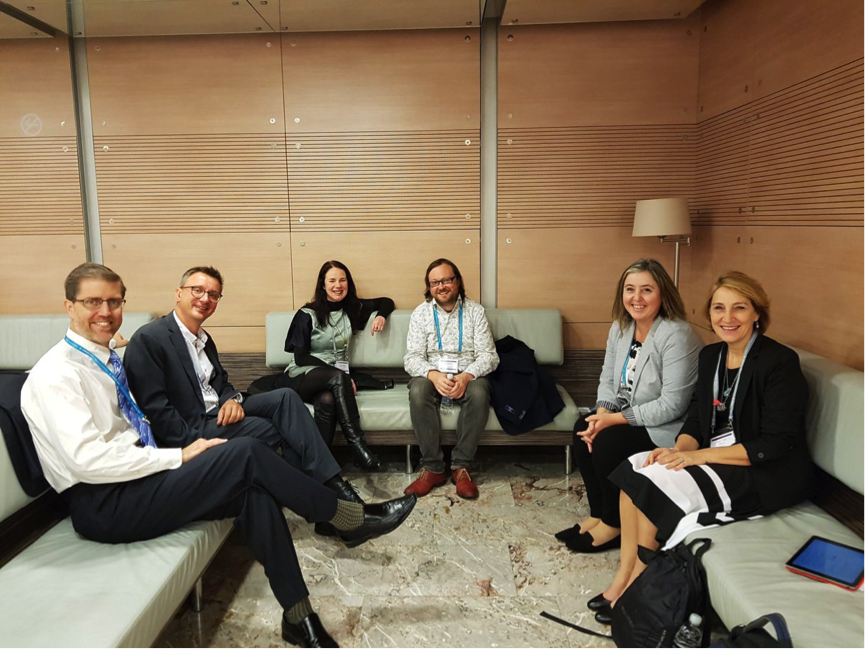Open Education Working Group meet in Ljubljana
Post written by Lorna M. Campbell

(L-R) Cable Green, Fabio Nascimbeni, Lorna M. Campbell, Leo Havemann, Virginia Rodés and Sophie Touzé at the OER World Congress, Ljubljana.
Members of the Open Education Working Group Advisory Board had a rare opportunity to meet face to face last week while attending the UNESCO OER World Congress in Ljubljana, Slovenia. The theme of the Congress which brought together delegates from 111 countries, was “OER for Inclusive and Equitable Quality Education: From Commitment to Action” and there was a strong focus on how OER can help to support United Nations Sustainable Development Goal 4.
“Ensure inclusive and equitable quality education and promote lifelong learning opportunities for all”
The main output of the Congress was the UNESCO Ljubljana OER Action Plan and accompanying Ministerial Statement. The Action Plan outlines 41 recommended actions to mainstream OER and to help Member States to build knowledge societies and provide quality and lifelong education.
Members of the Advisory Board took time out of the busy programme of talks, discussions, workshops and satellite events to meet and discuss recent activities and actions the group could take forward from the Congress.
Cable Green provided us with an overview of Creative Commons new Global Network Strategy which is focused around four platforms; open education, copyright reform, community development, and GLAM. We discussed how the Open Education Working Group could engage with the Open Education Platform as we share many of the same goals. The platform is open to all and provides a space to connect to global actions in open education resources, practice, and policy, plan and coordinate multi-national projects, and secure funding from Creative Commons and others. You can find out more about Creative Commons Open Education Platform here: Invitation to Join: CC Open Education Platform.
We discussed whether the group should schedule a new series of open education webinars, or whether it would be more useful to curate and provide access to webinars run by other organizations and institutions. We’d be interested in hearing your thoughts on this. Another idea we explored was whether it would be useful for the group to start mapping OER research and whether this could potentially be a starting point for a CC platform project proposal.
We also identified future events where group members could potentially meet face to face again including Creative Commons Summit (Toronto, April 2018), OER18 (Bristol, April 2018), OEC Global (Delft, April 2018), EDEN (Genoa, June 2018). Fabio Nascimbeni suggested it would be useful to have an OER18 strand at EDEN to draw the themes of these two events together. Sophie Touzé also encouraged the Group to engage with the Open Education Consortium around Open Education Week and this is something we were all very keen to explore.
 Lorna M. Campbell currently works as OER Liaison within the Learning, Teaching and Web division at the University of Edinburgh in Scotland. Her areas of expertise include digital infrastructure for OER, open education policy and practice, and technologies for supporting the management and distribution of educational content. Lorna has a longstanding personal commitment to supporting open education; she founded the Open Scotland initiative, was co-chair of the OER16 Open Culture Conference and is a Trustee of Wikimedia UK and the Association for Learning Technology. Lorna is also the driving force behind the Scottish Open Education Declaration.
Lorna M. Campbell currently works as OER Liaison within the Learning, Teaching and Web division at the University of Edinburgh in Scotland. Her areas of expertise include digital infrastructure for OER, open education policy and practice, and technologies for supporting the management and distribution of educational content. Lorna has a longstanding personal commitment to supporting open education; she founded the Open Scotland initiative, was co-chair of the OER16 Open Culture Conference and is a Trustee of Wikimedia UK and the Association for Learning Technology. Lorna is also the driving force behind the Scottish Open Education Declaration.
From 2002 – 1015 Lorna was Assistant Director of the Centre for Educational Technology and Interoperability Standards (CETIS) in the UK, during this time she contributed to the development of a number of learning technology standards and supported many national innovation programmes including the UKOER programme. Lorna maintains a number of blogs including Open World at lornmcampbell.org and Open Scotland at openscot.net and she regularly blogs and presents about a wide range issues relating to open education. Lorna has an academic background in archaeology and she has a long-standing interest in digital history and humanities. She can be followed as @LornaMCampbell on Twitter.
 Open Education Working Group
Open Education Working Group 



Leave a Reply